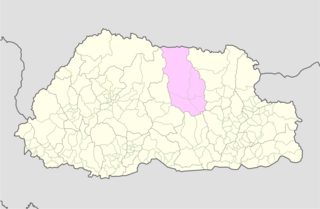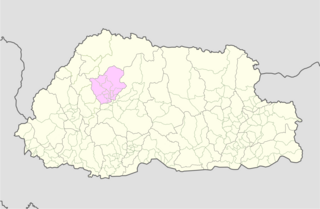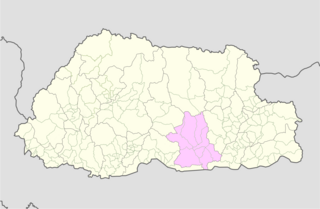
Bumthang District is one of the 20 dzongkhag (districts) comprising Bhutan. It is the most historic dzongkhag if the number of ancient temples and sacred sites is counted. Bumthang consists of the four mountain valleys of Ura, Chumey, Tang and Choekhor ("Bumthang"), although occasionally the entire district is referred to as Bumthang Valley.

Lhuntse District is one of the 20 dzongkhag (districts) comprising Bhutan. It consists of 2506 households. Located in the northeast, Lhuntse is one of the least developed dzhongkhags of Bhutan. There are few roads, the first gas station was opened in September 2005, electricity is not well distributed, and the difficult terrain makes distribution of social welfare problematic. Despite its favourable climate, farming is hindered by the lack of infrastructure.

Pemagatshel is one of the 20 districts of Bhutan.

Punakha District is one of the 20 dzongkhags (districts) comprising Bhutan. It is bordered by Thimphu, Gasa, and Wangdue Phodrang Districts. The dominant language in the district is Dzongkha, the national language.

A gewog, in the past also spelled as geog, refers to a group of villages in Bhutan. The head of a gewog is called a gup. Gewogs form a geographic administrative unit below dzongkhag districts, and above Dzongkhag Thromde class B and Yenlag Thromde municipalities. Dzongkhag Thromde class A municipalities have their own independent local government body.

A dungkhag is a sub-district of a dzongkhag (district) of Bhutan. The head of a dungkhag is a Dungpa. As of 2007, nine of the twenty dzongkhags had from one to three dungkhags, with sixteen dungkhags in total.

Bjoka Gewog is a gewog of Zhemgang District, Bhutan. Bjoka Gewog is also a part of Panbang Dungkhag (sub-district), along with Goshing, Ngangla, and Phangkhar Gewogs.

Chimoong Gewog is a gewog of Pemagatshel District, Bhutan.

Chongshing Gewog is a gewog of Pemagatshel District, Bhutan.

Dungmaed Gewog is a gewog of Pemagatshel District, Bhutan.

Khar Gewog is a gewog of Pemagatshel District, Bhutan.

Shumar Gewog is a gewog in Pemagatshel District, Bhutan.

Nanong Gewog is a gewog of Pemagatshel District, Bhutan.

Chokhorling Gewog is a gewog of Pemagatshel District, Bhutan.

Norbugang Gewog is a gewog of Pemagatshel District, Bhutan. Norbugang Gewog is part of Nganglam Dungkhag, along with Dechenling and Nganglam Gewogs.

Dechheling Gewog is a gewog of Pemagatshel District, Bhutan. Dechenling Gewog is part of Nganglam Dungkhag, along with Nganglam and Norbugang Gewogs.

Lauri Gewog is a gewog of Samdrup Jongkhar District, Bhutan. It was also part of Jomotsangkha Dungkhag (sub-district), together with Serthi Gewog.

The Bhutanese local government elections of 2011 were originally slated for 2008, but were delayed until 2011. Elections began on January 20, 2011, however polls opened in only 3 of 20 districts – Thimphu, Chukha District (Phuentsholing), and Samdrup Jongkhar – as part of a staggered election schedule. Polls closed June 27, 2011. Ahead of elections, 1,042 chiwogs, the basis of Bhutan's single-constituency electoral scheme, were slated to elect the leadership of Dzongkhag, Gewog, and Thromde governments.
Public holidays in Bhutan consist of both national holidays and local festivals or tshechus. While national holidays are observed throughout Bhutan, tsechus are only observed in their areas. Bhutan uses its own calendar, a variant of the lunisolar Tibetan calendar. Because it is a lunisolar calendar, dates of some national holidays and most tshechus change from year to year. For example, the new year, Losar, generally falls between February and March.
Sports in Bhutan comprise both traditional Bhutanese and modern international games. Archery is the national sport in Bhutan. Competitions are held regularly in most villages. Other traditional Bhutanese sports include khuru, soksom, pundo and digor.






